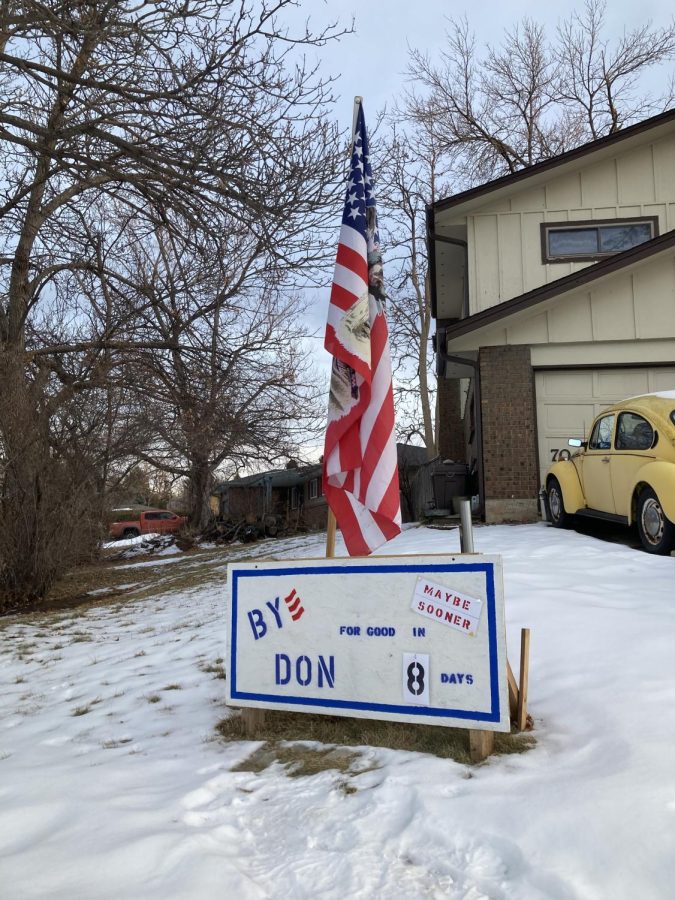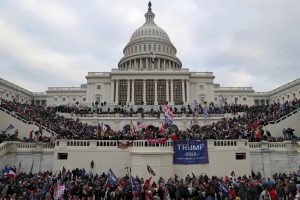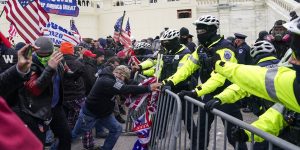A Year After the U.S. Capitol Was Breached, America’s Wounds Have Yet to Heal
A week after the Jan. 6 insurrection, a sign stood in a Centennial yard counting down the days until former president Donald Trump would leave office. After helping to incite the insurrection, Trump was impeached for the second time before his term was over. A year after the insurrection, it feels to many like the nation is still healing.
January 8, 2022
A dark shadow still hangs over the United States Capitol a year after American unity was shaken by extremists storming the building to protest the results of the 2020 election. For many, the scars the insurrection left will not be fast to heal.
The insurrection last January was not the first instance of political violence in America’s history, although the act of storming the Capitol by American citizens is new. Dr. Jeremy Castle, an assistant professor of political science at MSU Denver, said that much of the political violence in American history has been against individual people, often political candidates.
“In the past, there have been all-too-frequent instances of attacks on US politicians, with the assassinations of [presidents] Abraham Lincoln, James Garfield, William McKinley, John F. Kennedy, and [presidential candidate] Robert F. Kennedy as the most notable examples,” Castle said in an email. “People also forget that there was a life-threatening assassination attempt on Ronald Reagan. Within the last decade or so, we’ve seen the attempted assassination of Democratic representative Gabrielle Giffords (2012) and Republican representative Steve Scalise (2017).”
The breaking of windows and destruction was not the only thing to leave scars in the Capitol building. Many citizens and lawmakers alike heard a story of an American flag being torn down and replaced with a pro-Trump rally flag.
“People were desecrating the Capitol, tearing down American flags to put up Trump flags,” Creek history teacher Virginia Decesare said. “I don’t care if you support Trump or not, but to tear down an American flag to put up a name flag, that’s scary to me.”
The Jan. 6 insurrection came after a contentious presidential election between former president Donald Trump and current President Joe Biden. After Biden won, many Trump supporters pushed claims of widespread election fraud in everything from voting machines to mail-in ballots. Almost all of these claims have now been debunked, but the divisions they created are lasting. And while this is not the first time an election has been disputed, with historical examples as recently as 2000, it is the first one to result in such an attack.
“Certainly we have seen disputed elections before,” Castle said. “The 1876 presidential election ended with a debate over the winner of several states, but Congress eventually agreed on the ‘Compromise of 1877,’ in which Congress awarded the disputed votes to Rutherford B. Hayes in exchange for the end of Reconstruction and the withdrawal of the US military from southern states.”
In addition to disputed elections, the country has seen the Capitol breached once before. In 1814, British forces fighting during the War of 1812 burned the Capitol building – the only breach in US history before 2021. The fact that the Capitol building was breached by American citizens this time is unique.
“[This is] something we haven’t seen since the War of 1812,” news anchor Rachel Maddow said on a live MSNBC broadcast at the time. “The storming of the Capitol.”
Others thought that this attack was so unprecedented that it felt surreal to see in our country. America has a reputation for a stable democracy, so this unexpected violence was a big surprise.
“It felt like something you would see in a third-world country,” Decesare said. “The storming of the Capitol.”
The unprecedentedness of this attack left many questions for political scientists – and many concerning signals.
“The attacks are a sign that we have reached a new stage in political polarization,” Castle said. “It’s one thing when the parties cannot agree on how to deal with some issue, like the pandemic or the economy. It’s another thing when the capitol building was broken into, with at least some of the perpetrators intending to commit acts of violence against the sitting Vice President and members of Congress, and some members of Congress refuse to hold the politicians whose rhetoric fueled those attacks accountable.”
Castle’s concern, he explained, is that denying the results of a free and fair election threatens the integrity of future elections – the core of democracy.
“One of my big long-term concerns is that perpetuating the myth that the 2020 election was illegitimate may have the effect of reducing confidence in elections going forward,” Castle said. “Democracy depends on elections, and it depends on maintaining a delicate balance between majority rule and minority rights. If we see a pattern of disputed elections and decreased faith in the principles of democracy, that could lead to a whole host of negative consequences for the stability of the US government.”
After the storming of the Capitol, many believed that things in the country would take a turn for the better. But Decesare explained her opinion that nothing has strayed too far from normal life.
“I don’t think much has changed.” Decesare said. “And I don’t think enough leadership is coming out against what happened and calling out the fraud.”
Along with the detrimental political effects created by the insurrection, there have also been scars left in the minds of those working that day at the Capitol.
In a now-famous photo by Andrew Harnik, Representative Jason Crow (D-CO-6), who represents much of Creek’s student population, was seen assisting other congresspeople when the House of Representatives was put on lockdown. In statements released since the attacks, Crow described how his time in the military kicked in when the Capitol was breached.
“I can still vividly remember the sound of the rioters pounding on the doors to the House floor, then, a gunshot,” Crow said in an email sent to supporters on the anniversary of the insurrection. “I immediately called on my skills as a former Army Ranger while serving in Iraq and Afghanistan to protect our country and carry out my constitutional oath to protect our democracy from all enemies, foreign and domestic.”
These lasting psychological effects are not unique to Crow. In her Instagram stories on Jan. 6, Representative Alexandria Ocasio-Cortez (D-NY-14) described the difficult-to-navigate feelings of the anniversary.
“Today is not only a year since the traumatic events on the Capitol, but it also happens to mark two special days in our home: it’s Deco’s [Ocasio-Cortez’s French bulldog] ‘gotcha’ day as well as Three Kings’ Day, a particularly significant holiday in Latin America and celebrated a lot in Puerto Rico,” Ocasio-Cortez wrote. “We all process trauma differently and intuitively. A year ago today I woke up and went to work with plans to celebrate Deco’s first year on a holiday that’s been special to me since I was a little girl. I didn’t know a few hours later I’d be locking myself in a tiny bathroom, certain that I was going to die. So today is complicated – needing both space to honor and process what happened, but also not [letting] terrorist a-holes take the joy out of life.”
The news of the insurrection also had an impact on those who were nowhere near the Capitol on Jan. 6. Classes at Creek were in full swing when Decesare heard the news.
“That day [with] my AP US History kids we just processed it and talked about it,” Decesare said. “I asked the kids, ‘What are you thinking? What are you feeling?’”
The anniversary of the date a year later also sparked a new opportunity for representatives, senators, and others who experienced it to share their views on the subject. On the one-year anniversary of the storming, President Joe Biden delivered a speech that both recognized the importance of the day but also condemned the actions of the right-wing insurrectionists, including former president Donald J. Trump and his allies.
“Those who stormed this Capitol, and those who instigated and incited, and those who called on them to do so, held a dagger at the throat of America and American democracy,” Biden said.
Processing the event was important to move on from the fear that surrounded the storming, but recognizing what happened is also important. Learning from the insurrection helped people look back at Jan. 6 one year later and try to help rebuild America’s democracy.
In honor of the anniversary of the Jan. 6 insurrection, Crow introduced the Democracy In Action Toolkit. “As we continue to fight the disturbing forces that led to the January 6th attack, this list of concrete actions will help Americans activate to protect our democracy — that means getting involved, being a part of the election process, advocating for the things we all care about and supporting the truth,” Crow wrote.
For many, the last year was spent on edge, fearing a follow-up attack or something of the like. Though no such attack occurred, Castle believes that the lack of national conversations about the ordeal leaves an opening for something similar to happen in the future.
“Simply put, other than President Biden’s speech yesterday [Jan. 6], and the surrounding one-year anniversary news coverage, it hasn’t been a headline story,” Castle said. “That’s tragic, because without spending real time considering how these attacks happened, and without real efforts to hold the politicians who fueled these attacks with their rhetoric accountable, I fear that the United States may experience something similar in the near future.”





![Creek students rush to their first period class Dec. 10. In part because it was so late, Denver's first snow of the season complicated commutes and made getting to school harder, resulting in many students being late. "I got into [an] accident today," junior Ella Sommerfeld said of her morning commute.](https://unionstreetjournal.com/wp-content/uploads/2021/12/IMG_3202-300x225.jpg)


















